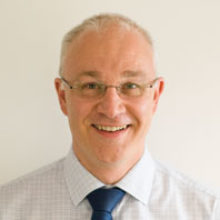From the Chief Executive
Issue: Water
17 November 2014 article

One of the best things about working at the Microbiology Society is the opportunity to meet and engage with the members – scientists whose work reveals the mesmerising array of patterns and processes at work in the microbial world and the practical power of this knowledge in everyday life. During my first few weeks as Chief Executive, it has been a great privilege to start meeting some of you and learn more about your science. I have been struck by the affection the members have for the Society and by the many ways in which you help make the Society such a vibrant place to work.
The first Focused Meeting, on the subject of soil microbiology, was fascinating. The sheer range of science made the event a stimulating experience – from genetic comparisons of fungi, through field-scale studies of soil compaction, to global estimates of the amount of carbon locked up in soils; and of course this diversity mapped on to the huge variety of uses to which the science can be put. We heard about modelling to inform policies on climate change, the bioremediation of former industrial sites and a host of agricultural applications of microbiology. My favourite part was meeting Shorok Mombrikotb, a graduate student who had chosen not to attend a more glamorous international conference because she really wanted to take part in the Society’s Focused Meeting. By lunchtime on the first day, she had met experts who could help advance her project with new samples and fresh insights.
Another of the events where I was able to meet members and find out about your work was the Annual General Meeting, which was coupled with the finals of the Sir Howard Dalton Young Microbiologist of the Year Competition. Not only did eight outstanding young researchers present on a wide variety of subjects, including HIV, food poisoning, herpesvirus, fungal infections and biofuels, we also saw senior scientists asking questions and continuing to learn from the young. At the President’s Dinner afterwards, the young microbiologists sat with Council members, Honorary Members and representatives from the wider scientific community, with everyone learning something new and developing their professional networks. Well done not just to the winners but to everyone who took part in the competition; it showed just how much potential there is among the early-career members of the Society.
The third big event at which I engaged with Society members was Champions’ Day. Eight of the Society’s new Champions came together to develop their plans for ensuring that microbiologists across the UK and beyond can benefit from the Society’s activities. The Champions will be arranging everything from a microbiology-themed pub quiz, organised by Marilia De Assis Alcoforado Costa in Dundee, to a symposium for early-career researchers from Alistair Walsham in Norwich. We could have called these energetic and resourceful people Ambassadors – but an ambassador is someone who takes instructions from headquarters and sticks to the official line. Champions are important individuals in their own right with their own ideas, and the Society sees its new Champions as a hugely important part of our efforts to enable you, the members, to get the maximum possible benefit from joining the Society.
The members’ survey that we undertook earlier in the year demonstrated a big appetite among microbiologists to get more involved with Society activities, and to work with the staff to build programmes that help you advance your science and develop your careers. I hope to meet many more of you in the coming months and learn about your research and your aspirations for your own careers and for the Society. Please feel free to contact me, tell me what we do well and where you want to see more, invite me to come and see your lab, and let me have your ideas on how the Society can focus on what you need to continue delivering the fascinating range of microbiology that I have been learning about in my early weeks at the Society.
PETER COTGREAVE
Chief Executive
[email protected]


